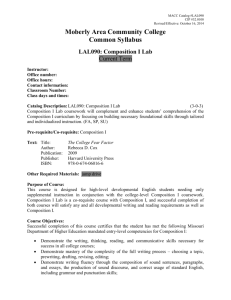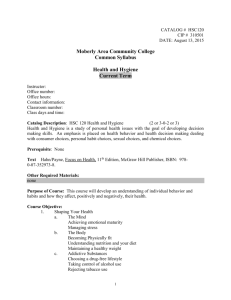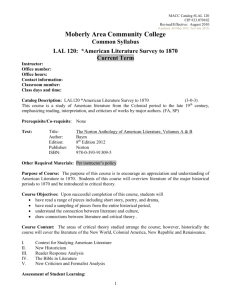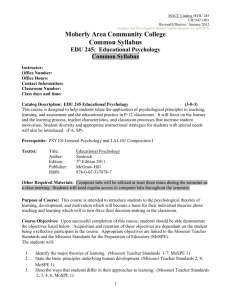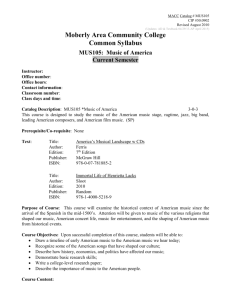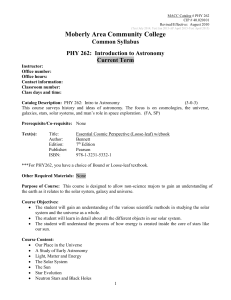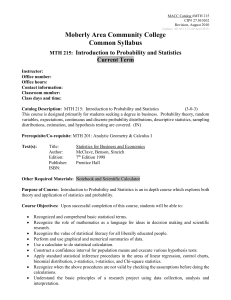EDU 220 Foundations of Education
advertisement
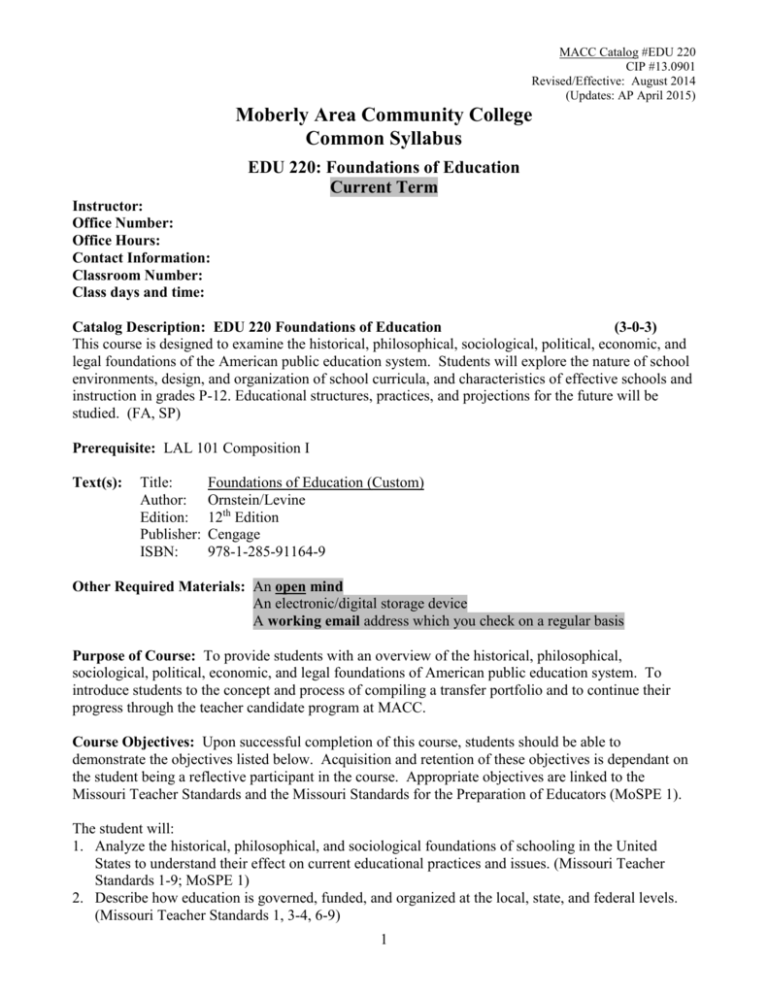
MACC Catalog #EDU 220 CIP #13.0901 Revised/Effective: August 2014 (Updates: AP April 2015) Moberly Area Community College Common Syllabus EDU 220: Foundations of Education Current Term Instructor: Office Number: Office Hours: Contact Information: Classroom Number: Class days and time: Catalog Description: EDU 220 Foundations of Education (3-0-3) This course is designed to examine the historical, philosophical, sociological, political, economic, and legal foundations of the American public education system. Students will explore the nature of school environments, design, and organization of school curricula, and characteristics of effective schools and instruction in grades P-12. Educational structures, practices, and projections for the future will be studied. (FA, SP) Prerequisite: LAL 101 Composition I Text(s): Title: Author: Edition: Publisher: ISBN: Foundations of Education (Custom) Ornstein/Levine 12th Edition Cengage 978-1-285-91164-9 Other Required Materials: An open mind An electronic/digital storage device A working email address which you check on a regular basis Purpose of Course: To provide students with an overview of the historical, philosophical, sociological, political, economic, and legal foundations of American public education system. To introduce students to the concept and process of compiling a transfer portfolio and to continue their progress through the teacher candidate program at MACC. Course Objectives: Upon successful completion of this course, students should be able to demonstrate the objectives listed below. Acquisition and retention of these objectives is dependant on the student being a reflective participant in the course. Appropriate objectives are linked to the Missouri Teacher Standards and the Missouri Standards for the Preparation of Educators (MoSPE 1). The student will: 1. Analyze the historical, philosophical, and sociological foundations of schooling in the United States to understand their effect on current educational practices and issues. (Missouri Teacher Standards 1-9; MoSPE 1) 2. Describe how education is governed, funded, and organized at the local, state, and federal levels. (Missouri Teacher Standards 1, 3-4, 6-9) 1 MACC Catalog #EDU 220 CIP #13.0901 Revised/Effective: August 2014 (Updates: AP April 2015) 3. Explore the legal and ethical issues pertaining to the provision of education services to all P-12 students and to the teaching profession. (Missouri Teacher Standards 1, 3-4, 6-9) 4. Write a personal philosophy of education. (Missouri Teacher Standards 6 & 8) 5. Examine characteristics of effective and ineffective schools and teachers. (Missouri Teacher Standards 3-4, 6, 8 & 9) 6. Evaluate current educational strategies designed to provide equal educational opportunities to a student population with diverse needs. (Missouri Teacher Standards 3-9) 7. Identify national, state, and local standards that guide curriculum decisions in public schools. (Missouri Teacher Standards 3, 7 & 8) 8. Document a variety of current trends and issues that impact education today. (Missouri Teacher Standards 1-9) Course Content: I. Historical foundations A. European beginnings to 21st century B. Pioneers in education C. Curriculum over major historical periods D. Review of current curriculum guide and school technology II. Philosophical foundations A. Philosophical roots of education B. Purposes of education C. Curriculum and instruction III. Sociological foundations A. Equal Educational Opportunity (SES, ethnicity, exceptionality, etc.) B. Awareness of how school and home environment affect school success C. Peer group influences D. Risk factors E. Standards movement F. Effective vs. ineffective schools and school choice G. Life in schools IV. Cultural foundations A. Student diversity B. Classroom strategies to address students who vary in approaches to learning C. Multicultural education and cultural pluralism V. Political foundations A. Governing public education at local, state, and federal levels, with emphasis on Missouri B. Financing public education C. Exploring Missouri Teacher Standards, Show Me Standards, MSIP, MAP, NEA, and AFT D. Discuss the Missouri Educator Profile (MEP) and Missouri General Education Assessment (MoGEA). VI. Legal foundations A. Legal aspects of education B. Ethical decision making C. Rights and responsibilities of public school students, parents, and teachers Assessment of Student Learning: Students will be provided opportunities to demonstrate their understanding of and ability to meet course objectives in a variety of assessment experiences. Many of 2 MACC Catalog #EDU 220 CIP #13.0901 Revised/Effective: August 2014 (Updates: AP April 2015) these experiences will be performance-based, some will have timed components. These experiences will allow students to communicate not only what they have learned from the readings and from the classroom experience, but also what they can DO with that information related to teaching. Description of Major Assignments and Categories: Required Assignments: Detailed handouts will be provided in class. One copy of each assignment completed should be turned into the instructor for grading. STUDENTS MUST RETAIN A DUPLICATE COPY OF MAJOR PROJECTS FOR THEMSELVES AS POSSIBLE ARTIFACTS TO INCLUDE IN THEIR PRELIMINARY CANDIDACY PORTFOLIO. The following provides a brief description of each category. I. Analysis and Reflection 50% Reactions to Readings-as assigned A. Educational Philosophy B. Annotated Bibliography II. Assignments A. Homework B. In class work C. Portfolio activities III. Assessment A. Quizzes (Some of which will be announced.) B. Tests 25% 25% Make-up and late work: Class work cannot be made up and will not be accepted late regardless of the reason for the tardiness or absence. Extra-credit work: Extra credit work may be offered but it will only be counted at the end of the semester for those students who have turned in all other assignments in a timely fashion. Statement to Connect Course with General Education Outcomes or Technical Program Outcome Statement: In compliance with MACC’s General Education outcomes, the student who successfully completes this course will be able to: Demonstrate effective written and oral communication skills. Demonstrate an understanding of scientific principles and computational skills and how to use them to solve problems and make informed decisions. (via application of the scientific principles which operate in the field of education) Assess and appreciate artifacts in language, art, music, or philosophy and be able to evaluate those artifacts as representations of form, cultural context, and individual expression. (via such artifacts which relate to teaching) Instructor Policies Academic Dishonesty: MACC board policy is as follows: “Academic dishonesty by students damages institutional credibility and unfairly jeopardizes honest students; therefore, it will not be tolerated in any form.” Forms of academic dishonesty include but are not limited to the following: violations of copyright law, plagiarism, fabrication, cheating, collusion, and other academic misconduct. Incidents of dishonesty regarding assignments, examinations, classroom/laboratory 3 MACC Catalog #EDU 220 CIP #13.0901 Revised/Effective: August 2014 (Updates: AP April 2015) activities, and/or the submission of misleading or false information to the College will be treated seriously. The procedure for handling academic dishonesty is outlined in the Student Handbook (Policy Handbook M.010). In cases of alleged academic dishonesty, the burden of proof is on the student, not on the instructor. Attendance Policy: Any student who misses two consecutive weeks of class during a regular sixteenweek semester or the equivalent proportion of class time during a shorter session will be dropped from the class by the instructor unless acceptable justification is supplied. An instructor must complete and file the appropriate forms to drop the student within one week following the student’s violation of the attendance policy. Additionally, any student who misses more than one-fourth of the entire number of in-seat class meetings in a regular 16-week semester or the equivalent proportion of class time during a shorter session, may be dropped from that class by the instructor if, in the opinion of the instructor, the student does not have reasonable opportunity to succeed in the class. A student’s attendance rate will be calculated based upon the first day of the semester (not the student’s date of enrollment in the course.) Student attendance must be defined in a different manner for online, hybrid, and virtual courses. Student attendance in these courses is defined as active participation in the course. Online, hybrid, and virtual courses will, at a minimum, have weekly mechanisms for student participation, such as any or all of the following methods: a. Completion of quizzes or exams b. Submission of assignments c. Participation in threaded discussions d. Communication with the instructor A student who does not participate in an online, hybrid, or virtual course for two consecutive weeks will be dropped by the instructor unless acceptable justification is supplied. An instructor must complete and file the appropriate forms to drop the student within one week following the student’s violation of the attendance policy. As with ground courses, a student’s attendance rate in online courses will also be calculated based upon the first day of the semester. If a student does not demonstrate active participation in the online course within the first two weeks (or the equivalent proportion of class time during a short session), the student will be dropped as “never attended.” Simply logging into an online class does not constitute active participation. Students should be aware that their dropping a course and their last date of attendance in the course may impact their financial aid. (Policy Handbook I.090 and M.095) We will think, act, and react as a community of learners and communicators. In order to do this everyone must attend on a regular basis. In connection with attending, listening, and participating in class are essential parts of active learning. I do not consider excuses. There is no such thing as an excused or unexcused absence. If you find it necessary to miss a class period, it will be your responsibility to find out what you will miss or missed. Not having information you missed is a problem for you, not me. It is also not an excuse for turning in late work. 4 MACC Catalog #EDU 220 CIP #13.0901 Revised/Effective: August 2014 (Updates: AP April 2015) Tardiness: If you plan to come to class, plan to come on time. I will take roll at the beginning of class. In the event that you arrive late, take your seat quietly. You will be counted absent unless you see me after class and ask me to adjust the record. Make-up and late work: per instructor’s policy Extra credit works: per instructor’s policy Schedule of Student Assignments/Activities: per instructor’s policy ADA Statement Students who have disabilities that qualify under the Americans with Disabilities Act may register for assistance through the Office of Access and ADA Services. Students are invited to contact the Access Office to confidentially discuss disability information, academic accommodations, appropriate documentation and procedures. For more information, please call either the Moberly office at (660) 263-4100 x11240 or the Columbia office at (573) 234-1067 x12120, or visit our web page at http://www.macc.edu/index.php/services/access-office. Title IX Statement MACC maintains a strict policy prohibiting sexual misconduct in any form, including sexual harassment, sexual discrimination, and sexual violence. All MACC employees, including faculty members, are considered mandated reporters of sexual misconduct and as such are expected to contact the Title IX Coordinator when they become aware, in conversation or in writing, of an incident of sexual misconduct. For more information on this policy or to learn about support resources, please see http://www.macc.edu/sexual-misconduct-policy or contact Dr. Jackie Fischer, MACC’s Title IX Coordinator, at 660-263-4110, ext. 11236 or jackief@macc.edu. 5
